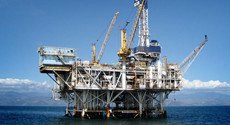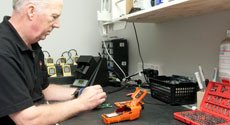Our gas detection systems thrive in the engineering & heavy manufacturing sector. Aluminium smelters, steel mills, pulp & paper plants and more…
On this page
- Gas detection in aluminium & steel production
- Gas detection in pulp & paper production (scroll down)
- FAQs (scroll down)
- Case studies (scroll down)
- Testimonials (scroll down)
Gas detection in aluminium & steel production
With so many furnaces, pots and processes that emit hazardous gases, aluminium smelters and steel mills have significant needs for gas detection.
Each step in the steel making process – from coke production through ingot casting and rolling – has its specific hazards that must be addressed with a properly matched gas detection system.
Each step in the aluminium smelting process – from reduction through alloying and casting to homogenising and the production of recycled carbon anodes – has its specific hazards that must be addressed with a properly matched gas detection system.
Specific applications
- Coke ovens
- Blast furnace
- Soaking pits
- Shutdown/turnaround maintenance
- Pickling and plating
- Aluminium smelting
- Hydrogen detection used for cooling
- Ppm hydrocarbon leak detection
- Confined space entry
- Inert gas blanketing
- Data-logging/industrial hygiene – workplace exposures
- Environmental
- Perimeter/fence-line monitoring
- Fixed point
Potential hazards
- Ammonia
- Carbon monoxide
- Hydrogen chloride
- Hydrogen cyanide
- Hydrogen fluoride
- Hydrogen sulphide
- Nitric oxide
- Nitrogen dioxide
- Perfluorocarbons
- Sulphur dioxide
- Volatile organic compounds
- Toxic gases
- Oxygen deficiency/enrichment
Entec provides a wide range of fixed gas detection systems and portable gas detectors for the aluminium smelting and steelmaking industry to help keep employees safe and production running.
Find out more…
Gas detection in pulp & paper production
With so many steamers, digesters, evaporators, recovery boilers, lime kilns, recausticisers, screeners, refiners, washers, delignifiers, bleachers, chelators and processes that emit hazardous gases, pulp & paper mills have significant needs for gas detection.
Each step in the paper making process – from wood chip pretreatment through cooking and pulping to delignification and bleaching – has its specific hazards that must be addressed with a properly matched gas detection system.
Specific applications
- Confined space entry
- Inert gas blanketing
- Data-logging/industrial hygiene – workplace exposures
- Environmental
- Perimeter/fence-line monitoring
- Fixed point
Potential hazards
- Chlorine
- Chlorine Dioxide
- Sulphur Dioxide
- Hydrogen Sulphide
- Volatile organic compounds
- Combustible gases
- Oxygen deficiency/enrichment
Entec provides a wide range of fixed gas detection systems and portable gas detectors for the pulp & paper industry to help keep employees safe and production running.
Find out more…
You can trust our expertise and rely on our service
We know your No. 1 priority is protecting your people and plant, and making sure you don’t fail legal or OSH requirements, have a staff member harmed or be prosecuted for an accident. With an increasing focus on health and safety in the workplace, your job depends upon it.
We understand the unique requirements of industry. You don’t need the hassle and risk of gas detectors that are expensive, problematic, unreliable, prone to sensor failures, require too much servicing, or have recurring problems. We’ll provide you with gas detection equipment that is…
- Cost-effective.
- Serviced locally in our authorised service centre (the only one in NZ).
- Easy and reliable to manage on-site via function test / bump test stations.
- Backed up with our support and expertise – we’ll be there when you need us.
Find out more…
FAQs
How long does your gas detection equipment last?
Depending on how they’re used there’s no reason a high-end gas detection instrument shouldn’t last 6 years. With low-cost instruments ($1,000) you will reach a stage where the gas detector is still fine but the cost of keeping it in the field is greater than buying a new one. For example, replacing two sensors and calibrating the unit could cost $1,100 compared to a new instrument at about $1,000.
What sort of water ingress protection do your gas detectors have?
All our instruments are IP rated (ingress protection rated). Typically IP67, which is very high. Gas detectors rated to IP67 must be dust tight and withstand immersion in water up to 1 metre deep for 30 minutes.
Solid particle protection level 6: No ingress of dust; complete protection against contact.
Liquid ingress protection level 7: No ingress of water in harmful quantity when the unit is immersed in 1 metre of water for 30 minutes.
See https://en.wikipedia.org/wiki/IP_Code for more info.
What are my options with bump testing / calibration?
We can provide you with options from the top end to the basic. With our iNet InSite programme you get all the bells and whistles, all the basics like data-logging, bump testing and calibration; plus you get reports on instrument usage such as…
- Instrument in alarm condition and alarm ignored.
- Instrument turned off whist in alarm condition.
- iNet Control.
What is iNet Control?
iNet Control is a web-based application accessible from any PC web browser that allows you to configure and manage your gas detector fleet. It gives you practical insights into your gas detection program using trends, performance metrics and custom reports.
Can you calibrate our gas detectors for us?
Yes. Calibrations done by us at our premises cost $140 per instrument.
Are gas detectors intrinsically safe?
Yes. All our instruments are independently tested by authorities such as ATEX, IECEx, ANZEx, UL, CSA and many more, usually country dependant.
New Zealand recognises the first 3. The gas detector has a sticker attached to it referring to the certification authority and its rating. Many have more than one authority rating, often 3.
How much do gas detectors cost?
Depending on sensor configuration and the number of gas detectors being purchased, the price varies from $950 to $4,500. The MX4, our most popular portable instrument, sells for $950 to $1,150 depending on configuration.
What’s the turnaround for service?
We have same-day turnaround for over 90% of the gas detection instruments we service and calibrate. It varies a little depending on the number of units in for service, but we strive for same day turnaround as much as possible.
Do your gas detectors detect toxic gases such as carbon monoxide (CO), nitric oxide (NO) and nitrogen dioxide (NO2)?
You would typically be looking at our MX4, MX6 and single gas models depending on the application, etc.
Do your gas detectors detect hydrogen sulphide (H2S)?
Yes. You would typically be looking at our MX4 model.
Do your gas detectors detect combustible gasses such as methane, hexane, pentane and ethane?
Yes. You would typically be looking at our MX4 model.
Can you train us in how to use the gas detectors?
Yes, most definitely. On delivery we like to spend time with the users taking them through the basic use of the gas detector. We also like to spend time with the users of the docking stations teaching them how to use them. Industrial Scientific also has very good online training modules.
Find out more…
Case study: How many detectors did you say?
One customer ordered 18 detectors from us but they actually only needed 13. They wanted the other 5 to provide cover when detectors were sent away for repair and calibration because that’s what they’d been conditioned to expect with the previous supplier and brand of gas detectors they’d been using.
Entec sold them just the 13 they needed and they’ve been happy customers for 12 years now. They are currently on their second generation of instruments and about to update to their third. The gas detection instruments have been so reliable and they’ve been so happy with our quality of service that they will not be going to market.
Case study: A confronting explosion
A customer was having reliability issues with the instrument in use. It all came to a head when in a potentially dangerous atmosphere one of their gas monitors exploded. We were asked for a quote the next day and have been supplying our relieved client ever since.
Testimonials
“John isn’t a sales rep. He knows the equipment inside out. They’re very professional. Very good to deal with. Really honest. They give me a lot of confidence in their ability and what we need. Some others just want to make a sale. Whereas I’ve been in a situation where I’ve said: Hey, what about this piece of equipment? And he’s said: It’s three times better than the gear you’ve got and three times more expensive. The equipment you’ve got is ideal for what you need if for. If he’d said to me you definitely need to buy this, I would have considered it.”
“John spends a reasonable amount of time with me and if I ring him, he’ll do his best to remedy something if there’s an issue. And there were a couple of technical teething issues at the beginning but he set me up with someone in Australia to talk with – a more technical focussed employee of theirs – and both of them have been great. They haven’t just sold me this piece of gear and then gone away.”
“There’s been a couple of things I haven’t been completely happy with and it’s been fixed, straight away. And I know there’s certainly no intent to mislead me, or just get in and then go away. They’re here to stay and we’re here to stay.”
“It was a big investment for us to put this equipment in but John has done some things he didn’t need to do, but he has. He’s provided me some additional benefits such as additional education or additional tools. I’ve been pretty impressed actually.”
– [Name withheld], OHS & training co-ordinator, waste management industry
“What sets Entec apart is that the service is pretty personal. We’ve got a good relationship with the guys that deal with us. We can pick up the phone quite easily and things get dealt with pretty swiftly. And the communication is good when stuff can’t happen – you’re not left wondering why. Like you might send 6 monitors away for calibration and there’s been a delay in the calibration gas or something like that, and they’ll let you know pretty quickly. So the service is pretty good but when issues pop up they’re good at letting you know what’s happened and why.”
“They’re keen to help out with the knowledge they have. They’re happy to take you through stuff whether it’s calibration related or how to fix monitors and that sort of thing. John comes to see us every three months or so and sometimes we don’t need to see him and when we do, he’s always available.”
– [Name withheld], health & safety advisor, pulp & paper industry
“With John, if you’ve got a problem, he can answer it. He doesn’t fob you off. If he doesn’t know the answer, he’ll get it for you which is really good. It’s the service – some other people just run for cover. Prior to using the products John has, it was disastrous. Absolutely disastrous. We had to send things away and they’d say they were changing sensors and they weren’t. We went right off them.”
“I hate pedlars. I don’t mind them selling their wares but half of them don’t even know about the wares they’ve got or how they operate. It’s sell and run. That’s why we’ve stuck with John. If you’ve got a problem, you can get hold of John or he always has someone you can contact. That’s the problem we had before – it was just dynamite. With John you can ring him and if he can answer it, he’ll answer it but he won’t lie to you. We had others come in to sell to us and I said: ‘I want the product but I also want the service.’“
“One of the important things is the calibrating. It’s no good having a gas monitor and all of a sudden it’s failed. We calibrate them ourselves or if we have a problem we go back to John. Others told us we had to send the monitors away for them to do it, and only later got on the bandwagon that you could calibrate yourself but by then it was too late. If they couldn’t do it before, why try and do it now because someone else is?”
“With John we have genuine service. It’s not a problem to ring up and he’ll try to tell us what to do, and then if it’s a problem we send it to him. John has been with these gas monitors a long time so he knows them. We’ve been with him for years and then upgraded. He won’t rip you off.”
“John really knows the product and that’s important. Plus it’s the service that we’re all after and we get that from him. He does genuinely try to help you. If you’ve got a problem, he doesn’t try to fob you off. As well as selling them, he’s actually learnt about them. Whereas some of the others… I said to one guy: ‘How long have you been doing this?’ He said 6 weeks. I told him to come back when he’d been doing it for 6 years. I knew it was just a spiel because I started to ask questions and I had him locked. You need to know your product because of the safety side of it.”
“John helps us solve our problems. Service-wise, it’s the best we’ve ever, ever had. I said to John one day, ‘Why do you tell us all this?’ and he said, ‘It’s no good if you have a problem and someone gets hurt.’ We’ve just had so much value from him. And his company supports him. I think they genuinely think about their customers.”
“John would give us a monitor to try too, but some of these others would sell it to you – but they’re not going to let you try it.”
– [Name withheld], maintenance support planner, pulp & paper industry
“For about 8 years we’ve been using the Industrial Scientific iTX machines. We went to them when we needed to upgrade our machines and we looked around and the iTX seemed to suit us mainly because of its reliability, durability and its ease of use. We’ve had a good run out of the equipment since we bought it. It’s fulfilled our needs and there’s been really good service and backup support for the equipment. It’s still in service and we’ll probably get another few years out of it. We’re already looking into upgrading and sticking with the same equipment but just the later model.”
“It’s a safety system and it’s important that it’s accurate and that it functions when we want it to function. So reliability is one of the biggest benefits we get from the iTX equipment. Our equipment before iTX was fairly unreliable. It was expensive to keep because we were forever sending the equipment away to be serviced whereas with this iTX equipment we can do all our own calibrations onsite and the docking station equipment only needs to be calibrated once every two years and Entec supply that service. It means that the equipment is available a heck of a lot more than our previous equipment.”
“Probably once a month we run all our equipment through the calibration scenarios at work and it means that the equipment is just available all the time and it doesn’t take a heck a lot of time so people can carry on doing their normal jobs.”
“The thing that’s key for us is during major outages or shutdowns we often hire in more equipment and it’s very easy to get, it’s user-friendly, and the later models really help us in making decisions on which way we’re going to go in the future. So the models we had at this years’ shutdown were the next level up from what we currently own and they’re probably what we’ll go to in the next couple of years.”
– [Name withheld], mill manager, pulp & paper industry
Do you have questions?


